Yogarajah Nanthagaopan has successfully completed the first PhD in Project Management from the Faculty of Management. He was supervised by Dr Nigel L. Williams and Professor Stephen Page and his thesis was titled: A Resource Based Perspective on Project Management in NGOs. Dr Nanthangaopan has returned to his native Sri Lanka and is the current Head of Economics and Management department and Coordinator for the BBM in Project Management degree program at the Faculty of Business Studies, Vavuniya Campus of the University of Jaffna, Sri Lanka.
Category / Entrepreneurship & Economic Growth
New research ethics paper Faculty of Health & Social Sciences
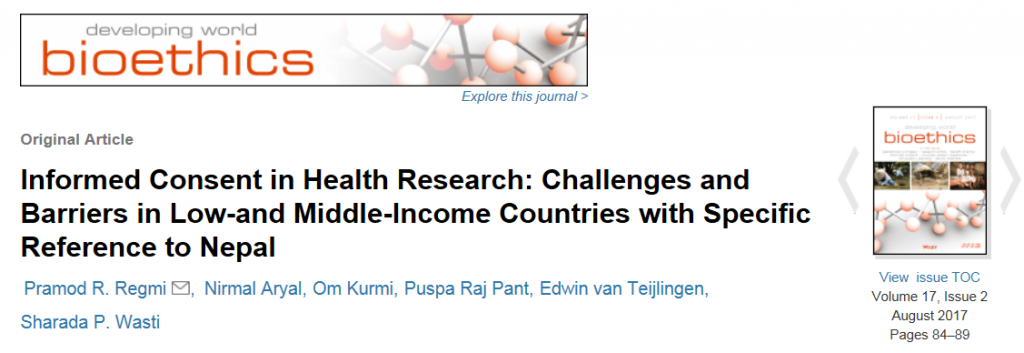 Next months sees the publication of our latest article on research ethics in developing countries [1]. Our paper argues that despite a significant increase in health research activity in low-and middle-income countries (LMICs) in recent years, only limited work has been done to address ethical concerns. Most ethics committees in LMICs lack the authority and/or the capacity to monitor research in the field. This is important since not all research, particularly in LMICs region, complies with ethical principles, sometimes this is inadvertently or due to a lack of awareness of their importance in assuring proper research governance. With several examples from Nepal, this paper reflects on the steps required to obtain informed consents and highlights some of the major challenges and barriers to seeking informed consent from research participants. At the end of this paper, we also offer some recommendations around how can we can promote and implement optimal informed consent taking process.
Next months sees the publication of our latest article on research ethics in developing countries [1]. Our paper argues that despite a significant increase in health research activity in low-and middle-income countries (LMICs) in recent years, only limited work has been done to address ethical concerns. Most ethics committees in LMICs lack the authority and/or the capacity to monitor research in the field. This is important since not all research, particularly in LMICs region, complies with ethical principles, sometimes this is inadvertently or due to a lack of awareness of their importance in assuring proper research governance. With several examples from Nepal, this paper reflects on the steps required to obtain informed consents and highlights some of the major challenges and barriers to seeking informed consent from research participants. At the end of this paper, we also offer some recommendations around how can we can promote and implement optimal informed consent taking process.
 The paper is co-written by six authors, and interestingly five are graduates of the University of Aberdeen. These Aberdeen University graduates are currently affiliated with five different universities. Four of who are based in the UK at: the University of Liverpool, the University of the West of England, the University of Oxford, and in Bournemouth University’s Centre for Midwifery, Maternal & Perinatal Health (CMMPH) and one in the USA: Georgetown University. The sixth co-author, Nirmal Aryal, is currently a PhD student at the University of Otago in Dunedin (New Zealand). Whilst Liverpool-based researcher Dr. Pramod Regmi is heading back for Bournemouth University to become a lecturer in International Health in the Faculty of Health & Social Sciences this autumn.
The paper is co-written by six authors, and interestingly five are graduates of the University of Aberdeen. These Aberdeen University graduates are currently affiliated with five different universities. Four of who are based in the UK at: the University of Liverpool, the University of the West of England, the University of Oxford, and in Bournemouth University’s Centre for Midwifery, Maternal & Perinatal Health (CMMPH) and one in the USA: Georgetown University. The sixth co-author, Nirmal Aryal, is currently a PhD student at the University of Otago in Dunedin (New Zealand). Whilst Liverpool-based researcher Dr. Pramod Regmi is heading back for Bournemouth University to become a lecturer in International Health in the Faculty of Health & Social Sciences this autumn.
Prof. Edwin van Teijlingen
CMMPH
Reference:
- Regmi, P.R., Aryal, N., Kurmi, O., Pant, P.R., van Teijlingen, E., Wasti, P.P. (2017) Informed consent in health research: challenges and barriers in low-and middle-income countries with specific reference to Nepal, Developing World Bioethics 17(2):84-89
BU prof speaking at the University of Sheffield
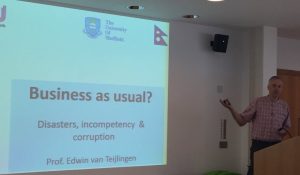 BU professor Edwin van Teijlingen from the Centre for Midwifery, Maternal & Perianal Health (CMMPH) had the honour of being invited to speak at a workshop ran yesterday by the Sheffield Institute for International Development. The workshop ‘Nepal: Reconstruction, Resilience and Development’ was organised by the University of Sheffield.
BU professor Edwin van Teijlingen from the Centre for Midwifery, Maternal & Perianal Health (CMMPH) had the honour of being invited to speak at a workshop ran yesterday by the Sheffield Institute for International Development. The workshop ‘Nepal: Reconstruction, Resilience and Development’ was organised by the University of Sheffield.
Prof. Edwin van Teijlingen spoke about endemic corruption in Nepal and opportunities that are offered by disasters such as earthquakes for more corruption. He pointed out that there is little research on corruption in Nepal, despite its low ranking on the international Corruption Perceptions Index. The presentation can be viewed here: Nepal earthquake corruption 2017 . 
He pointed out that disasters are confusing events with often loads of money and relief aid arriving under chaotic conditions. Immediate emergency aid needs to be distributed to unknown people (‘those affected’), in difficult to access areas, under often chaotic socio-political conditions.
He also reminded the audience that corruption (and corrupt behaviour) are not limited to low-income countries. He highlighted the Ariana Grande case in Manchester (UK) where thousands falsely claimed to have been at the original attacked concert when applying for a ticket for the Manchester One Love concert.
Dr Elvira Bolat is awarded Academy of Marketing Research Fund 2017
Dr Elvira Bolat from the Department of Marketing at the Faculty of Management has been awarded the prestigious Academy of Marketing Research Fund.
Her research titled ‘From Compassion to Defence: Exploring Service Brands’ Trust Repair Mechanisms across Traditional and Digital Media’ is the sub-project of the Faculty of Management’s QR-funded project on Trust Repair in the service sectors, led by Dr Julie Robson. 
Using integrative content analysis and emotional text analysis, Dr Bolat’s project will explore the trust repair process and trust repair mechanisms used in the context of traditional and digital media, within selected high profile trust erosion cases in the service sectors. Dr Robson (Department of Marketing, FM), Professor Juliet Memery (Department of Marketing, FM) and Dr Caroline Jackson (Department of Leisure and Events, FM) are acting as mentors for the project and advising on the contextual setting of the study.
Moreover, this project supports Dr Bolat in acquiring new skills in quantitative analysis of qualitative data and deepening understanding and use of language processing software.
Dr Bolat comments: “Academy of Marketing is one of the biggest international organisations to support marketing scholars and to be one of the few recipients of this prestigious funding scheme is an absolute honour. This also helps our QR project to extend its impact and reach.”
To find out what other projects are recipients of this year’s Academy of Marketing Research funding scheme, access: https://www.academyofmarketing.org/research/amrc-research-funding/
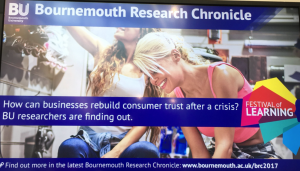 Trust Repair team has delivered a successful Festival of Learning 2017 event on 11 July titled ‘Lies and Scandals: Whatever happened to Trust?’ and received an overwhelmingly positive feedback from the audience. Once of things that came out of this interactive event is a powerful impact media has on stakeholders’ interpretation of organisational transgressions and, therefore, on ability of brands to repair trust damage. Hence, this sub-project will help in extending scholar’s and practitioners’ understanding on role of both traditional and digital media play in repairing trust towards brands.
Trust Repair team has delivered a successful Festival of Learning 2017 event on 11 July titled ‘Lies and Scandals: Whatever happened to Trust?’ and received an overwhelmingly positive feedback from the audience. Once of things that came out of this interactive event is a powerful impact media has on stakeholders’ interpretation of organisational transgressions and, therefore, on ability of brands to repair trust damage. Hence, this sub-project will help in extending scholar’s and practitioners’ understanding on role of both traditional and digital media play in repairing trust towards brands.
This grant is a very positive recognition of BU’s standing internationally and nationally within marketing and consumer behaviour research and contributes towards a growing impact generated by Influences on Consumer Behaviour research centre.
To connect with Dr Bolat, email at ebolat@bournemouth.ac.uk or tweet at @Elvira_MLady
To follow Trust Repair project, tweet at @TrustRepairBU
AiMM Awarded Doctoral Summer School!
The Advances in Media Management (AiMM) research cluster have been awarded the European Media Management Association’s Doctoral Summer School 2018.
AiMM is a cross faculty research collaboration between the Faculty of Media & Communications and the Faculty of Management and this award follows on from AiMMs success in hosting the association’s annual conference at BU in 2013.The Doctoral Summer School will be held at BU between the 2-4th July 2018 and is targeted at PhD students at all stages of their research, as well as early-stage post-docs.
Congratulations go to the bid team: Dr John Oliver, Dr Chris Chapleo, Dr Joyce Costello, Graham Goode, Melanie Gray and Conor O’Kane.
Nepal conference at BU
 FHSS has the honour of hosting the 15th BNAC (Britain-Nepal Academic Council) Nepal Study Days on 12-13 April 2017. All presentations will focus on Nepal, its diaspora and/or the Nepali cultural world. This year’s programme includes a range of issues and studies from across different disciplines. In the past decade these study days have been at universities across the UK, including Liverpool John Moores University, the University of Oxford and the University of Edinburgh.
FHSS has the honour of hosting the 15th BNAC (Britain-Nepal Academic Council) Nepal Study Days on 12-13 April 2017. All presentations will focus on Nepal, its diaspora and/or the Nepali cultural world. This year’s programme includes a range of issues and studies from across different disciplines. In the past decade these study days have been at universities across the UK, including Liverpool John Moores University, the University of Oxford and the University of Edinburgh.
This year several presenters of oral presentations or posters are affiliated with BU (staff, PhD students and FHSS Visiting Faculty). These include the following presentations:
- Identifying the gaps in Nepalese migrant workers’ health and well-being: A review of the literature, by Padam Simkhada, Pramod Regmi, Edwin van Teijlingen & Nirmal Aryal
- Assessing the need and type of continuing professional development (CPD) for nurses trained and working in Nepal, by Bibha Simkhada, Edwin van Teijlingen, Padam Simkhada, Sean Mackey, Rose Khatri, Chandra Kala Sharma & Sujan Marahatta
As well as the following posters
- Reflections on THET-funded maternal mental health training in Nawalparasi, by Jillian Ireland, Andrea Lawrie, David Havelock, Padam Simkhada, Edwin van Teijlingen, Bibha Simkhada, Bhimsen Devkota, Lokendra Sherchan, Ram Chandra Silwal & Shyam K. Maharjan.
- Factors affecting health facility delivery in rural Nawalparasi district of Nepal, by Preeti K Mahato, Edwin van Teijlingen, Padam Simkhada, Zoe Sheppard & Ram Chandra Silwal
- Food belief practices amongst rural and urban mothers in Nepal: A qualitative overview, by Jib Acharya, Edwin van Teijlingen, Jane Murphy & Martin Hind
‘How boards strategize’ explored in new student-staff study

Marg Concannon
The strategy work of boards of directors has been a puzzle in the corporate governance literature for a long time. But the picture is becoming clearer, thanks to a paper soon to be published and co-written by a Master’s graduate and staff member in the Faculty of Management at BU.

Donald Nordberg
Going for Gold: 3D Printing, Jewellery and the Future of Intellectual Property Law
Date: Friday 24 March 2017
Time: 10.00 am – 5pm
Venue: EB708, Executive Business Centre, Bournemouth University
The event is free to attend, however, places are limited and registration is required.
About the Event:
Additive Manufacturing or 3D printing as it is more commonly known, continues to push the boundaries of Intellectual Property (IP) law whilst raising questions relating to the protection and exploitation of IP.
There have been various attempts to address these questions through legal and empirical studies; yet at the same time, there continues to be limited literature and debate on the implications of 3D printing surrounding IP law, industry, society, technology and policy.
This challenge, which extends to the lucrative jewellery sector raises further questions in relation to creativity, design, copyright and licensing and these issues will be addressed at the event by bringing together experts from the cultural and business sectors including designers, manufacturers, distributors, policy makers and legal professionals.
This multi-disciplinary event which will explore the above issues will also provide the platform for a discussion of the ‘Going for Gold’ project carried out by researchers at CIPPM (Bournemouth University) in collaboration with Museotechniki Ltd and Uformia AS and will be complemented by a demonstration of 3D printed jewellery artefacts resulting from the project.
The event, based on the ‘Going for Gold’ project led by Professor Dinusha Mendis, is supported by the RCUK funded Centre for Copyright and New Business Models in the Creative Economy (CREATe), AHRC Grant Number AH/K000179/1 and builds on the BU/CIPPM-led UK Intellectual Property Office (UKIPO) Commissioned Study on 3D Printing and IP law completed in 2015.
Confirmed Participants and Speakers:
Mark Bloomfield (Electrobloom); Roger Brownsword (Bournemouth University / Kings College London); Ruth Burstall (Baker & McKenzie LLP); Frank Cooper (Jewellery Industry Innovation Centre, Birmingham Jewellery School); Lionel Dean (De Montfort University); Damian Etherington (Ipswich Museum); Nikolaos Maniatis (Museotechniki Ltd); Dids McDonald (Anti Copying in Design); Dinusha Mendis (Bournemouth University); Cherie Stamm (Uformia AS); Andrea Wallace (CREATe, University of Glasgow); Michael Weinberg (Shapeways Inc).
For inquiries, please contact Dinusha Mendis at dmendis@bournemouth.ac.uk
Interreg Opportunities
 Following the successful visit by UK Interreg Territorial Facilitators to BU on 21st February 2017, please find out more about the current Interreg call, which is open from 1 March until 30 June 2017.
Following the successful visit by UK Interreg Territorial Facilitators to BU on 21st February 2017, please find out more about the current Interreg call, which is open from 1 March until 30 June 2017.
It is targeted at public authorities and non-profits
- National, regional or local authorities
- Other organisations in charge of defining and implementing regional policy instruments
- Non-profits
Projects must focus on one of these topics
- Research and innovation
- SME competitiveness
- Low-carbon economy
- Environment and resource efficiency
Support is available on the call website, including instructional videos, partner search, online project self-assessment, project feedback before submission and a demo of the application form.
If BU academics are interested in applying for this call, please contact Emily Cieciura, RKEO’s Research Facilitator: EU & International
British Academy Visit – reserve your place now!
 The British Academy is returning to BU on 8 March 2017. This is an invaluable opportunity to find out more about the international and domestic funding available through the organisation. For those of you who are not familiar with the British Academy, it is the UK’s leading independent body for the humanities and social sciences, promoting funding, knowledge exchange and providing independent advice within the humanities.
The British Academy is returning to BU on 8 March 2017. This is an invaluable opportunity to find out more about the international and domestic funding available through the organisation. For those of you who are not familiar with the British Academy, it is the UK’s leading independent body for the humanities and social sciences, promoting funding, knowledge exchange and providing independent advice within the humanities.
The session will last just over 1 hour (13:00-14:15) and will comprise a presentation focusing on international and domestic funding opportunities along with an overview of the British Academy, followed by a Q&A session.
Representatives of the British Academy will be available to answer any individual queries not covered in the presentation or Q&A session, and members of the Research and Knowledge Exchange Office will be on hand should you wish to discuss BU’s processes for bidding to the organisation.
Places for this event can be reserved through Organisational Development here.
HE policy update w/e 27th January 2017
Industrial Strategy Green Paper
The Government launched the Industrial Strategy Green Paper and consultation this week. The paper focuses on improving Britain’s innovation and productivity in key areas alongside upskilling the workforce to become world leading. The government suggest a number of areas of industry specialism that should be supported:
- clean energy
- robotics
- healthcare
- space technology
- quantum technology
- advanced computing and communications
The document frequently references the role of Universities as innovation leaders pushing for commercialisation and greater productive cooperation with business. It states that the ‘neglect of technical education’ should be redressed and insinuates that higher-level technical education will be pushed towards the new Institutes of Technology (£170 government investment announced – see below). There is an emphasis on rebalancing the difference in Britain’s economic geography through infrastructure investment. In addition, it criticises how UK research funding is currently heavily invested in the ‘golden triangle’ (Oxford, Cambridge, London) and calls to build on research strengths in businesses as well as other universities. The strategy has a strong focus on STEM and Wonkhe have reported that The British Academy are urging the government not to forget investment in social sciences and humanities teaching and research, which they argue are vital to the continued development of the UK’s services sectors.
The consultation ends in April, we’ll be in touch shortly about how you can contribute to a BU response.
While the strategy has only just been launched it was preceded by the announcement of the new Industrial Strategy Challenge Fund (Nov 2016) and consultative workshops. The workshops aimed to ensure that the challenges identified match UK business capability and are based on the best available evidence for scientific and commercial success on the global stage. The challenges mirror the industry specialisms proposed in the green paper but also mention the creative industries and integrated cities. The workshops conclude this week, implementation plans are expected to follow from the government and the first challenge is expected to be announced in March.
In an interesting article in The Conversation Graham Galbraith, VC at Portsmouth, urges Universities to shun new institutions for innovation and instead form a network of hubs building on relationships with employers, skills organisations and FE colleges. Furthermore he resists the government’s distinction between academic and technical education, seeing the productivity answer through flexible routes to university study and developing skills courses that employers need in accessible ways. He believes the university sector would deliver this far more quickly than new Institutes of Technology. Galbraith also criticises REF 2021: “The government wants the UK to be better at commercialising its world-class, basic research. But the… require[ment]…to include all academic staff…will have the effect of making universities re-balance their staff’s priorities so that there is more focus only on peer-reviewed research and less on outward-facing activities like business collaborations.”
Brexit –The Supreme Court has ruled that Parliament must vote to trigger Article 50 which begins the Brexit process. The government timescale is to trigger Article 50 by end of March and to this end they have introduced a European Withdrawal Bill (EWB). The European Withdrawal Bill gives the PM the power to notify the European Council of the UK’s intention to withdrawn from the EU through the required Act of Parliament. It is being fast tracked through Parliament. Parliamentary time is scheduled for 31 Jan, 1 Feb, 6-8 Feb. The House of Commons Education Select Committee continues visits to Universities (Oxford, UCL) to examine impact of Brexit on HE. At the UCL visit (Wednesday) Michael Arthur (Provost) broke the UCAS data embargo revealing a 7% drop in EU applicants in the current cycle. The Guardian leads with ‘first decrease after almost a decade of unbroken growth blamed on… Brexit’. Committee Chair, Neil Carmichael is reported on Twitter as asking whether HE needs a sector-specific Brexit deal – panel response ‘yes absolutely!’
Higher Education and Research Bill (HERB) – The Lords continue to scrutinise the HERB carefully with the long list of amendments. The list has stopped growing quite so quickly but new amendments proposed this week include one to set up a new UKRI visa department that will sponsor academics (507ZA). So far apart form the first one, no amendments other than government amendments have been passed, but the level of debate and the length of the list suggests that there may have to be some concessions by the government. James Younger, the government lead on the Bill in the Lords, wrote to Peers on 25th January about the bill.
Given the timing of the Brexit discussions, Wonkhe speculate that to achieve the timescales for the Bill and to clear sufficient parliamentary time for the European Withdrawal Bill to be passed the government may make concessions on HERB. Key discussions this week:
- NSS statistically unfit for TEF – Lord Lipsey discussed the statistical inadequacies of NSS and the implication for this as a TEF metric. “The NSS in the TEF is using—or rather, abusing—statistics for a purpose for which the NSS was never designed.” Lipsey acknowledged that the Government have gently retreated from the emphasis on NSS scores – in their latest instructions to assessors they stated: “assessors should be careful not to overweight information coming from the NSS“. This was reinforced by Chris Husbands, Chair of TEF, who informed a meeting at the House of Commons this week that his team would “not be overweighting the NSS” when awarding ratings this year. The proposed amendment was withdrawn after Viscount Younger: stressed the NSS was not the primary source of information for the TEF and that the framework was about much more than metrics. “Providers submit additional evidence alongside their metrics, and this evidence will be given significant weight by the panel”. HE continued: “we cannot ignore the only credible, widely used metrics that captures students’ views”.
- There were also debates about the gold/silver/bronze ratings and the government provided reassurance that Bronze was “above a high quality baseline”. This contradicts statements made by some in DfE before the final specification was agreed about Bronze institutions “needing improvement”. The panel have praised positive communication on this subject.
- Validation – The government have issued a factsheet for the Lords on Validation which provides explanation from the perspective of an alternative provider seeking to enter a validation arrangement. It describes Clause 46 of HERB, which gives the Office for Students (OfS) power to commission authorised HE providers to provide validation if other providers decline. It states such authorised providers are free to choose whether they wish offer this service, however once an arrangement is in place the OfS could require them to validate award) delivered by other registered HE providers. The commissioned arrangement would be made public. The controversial Clause 47 which appoints OfS as the validator of last resort was also discussed. The controversy arises as OfS isn’t an academic institution and doesn’t hold Degree Awarding Powers. The OfS will advise the Secretary of State (SoS) if intervention is required (likely through an evidence based report and stakeholder consultation) and the SoS would then authorise the intervention through regulation which is subject to parliamentary scrutiny.
- Contract Cheating – The amendment proposed by Lord Storey on contract cheating was withdrawn following Government reassurance. Lord Storey provided a passionate discourse including detailed sector information and cheating statistics. Baroness Goldie confirmed that the Government were addressing cheating referencing the (Aug 2016 published) QAA investigation and Jo Johnson’s commitment to close working to progress the recommendations. She revealed that the Minster would shortly announce a new initiative to tackle cheating in conjunction with QAA, Universities UK, NUS and HEFCE.
TEF
The 15 page written submissions for year 2 of the TEF were finalised and submitted this week, and this was the final opportunity for institutions to opt out of the TEF. Although there may have been others who have not published their positions, most Scottish Universities have opted out, as well as the Open University. Given the difference in the Scottish funding system they have less to gain from the TEF – but the 4 who have opted in have noted international reputation as a crucial factor. The OU explain their non-participation is due to the poor fit of the metrics with their social mobility demographic.
And the future of the TEF? According to Research Professional, a German academic has criticised the way that teaching excellence funding is being used in Germany.
“Whereas lower-ranked universities have tended to spread their funding from the programme thinly across faculties and courses, higher-ranked institutions have had the luxury of being able to focus on priority areas, the analysis found.
“You are starting to see emerging differences between disciplines taught at different universities,” Bloch told Times Higher Education on 17 January. For the first time, elite universities are starting to build up strong institutional identities when it comes to teaching, in an effort to get further ahead.
“It will be a long time before we reach the stratification that you see in the American system [around teaching], but we are seeing a difference for the first time in how resources in teaching are distributed,” he said.
UCAS 2016 entrants report – this data includes applications, offers and placed rates by sex, area background (LPN-polar 3), and ethnicity. BU’s report can be selected from the drop down menu towards the end of the webpage. The Guardian reports on the lower offer rates to black applicants. Wonkhe covers the HEIs that have a significant upward or downward trend in acceptances
Research Impact training: Parliament are running a Research, Impact and the UK Parliament event in Bristol on Wednesday 1 March. It covers the basics of the Parliamentary process and how academics can engage with parliament through their knowledge and research to inform scrutiny and legislation, including the impact of influencing policy to support REF submissions.
Wanted! External Bid Writers

As part of the Research and Knowledge Exchange Development Framework, Bournemouth University is expanding its pool of external bid writing expertise, through a tendering process.
If you have worked with a good bid writer or, as an external subscriber to this blog, you have written successful research funding applications, please contactus in the Research & Knowledge Exchange Office
We are particularly interested in those who can provide short courses, one-to-one support, bid writing retreats, application review or a range of these and related activities.
Examples of key funders include:
- British Academy
- European Commission funds including Horizon 2020
- Innovate UK
- Leverhulme Trust
- National Institutes of Health and other US Federal funders
- Research Councils
- Royal Society
- Wellcome Trust
- etc.
We look forward to hearing from you.
FHSS Dr. Pramod Regmi speaking in India
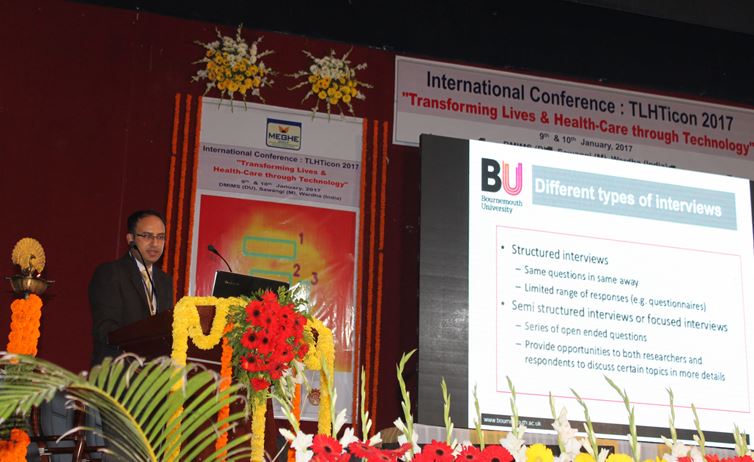 Two BU papers and a poster at the International Conference on Transforming Lives & Healthcare through Technology
Two BU papers and a poster at the International Conference on Transforming Lives & Healthcare through Technology
On 9th January 2017, I presented a paper entitled ‘Qualitative research in health technology assessment’ in a scientific session at the International Conference on Transforming Lives and Health Care through Technology (TLHTicon 2017), Wardha, India. This paper was prepared jointly with by Prof Edwin van Teijlingen and BU’s Visiting Prof Padam Simkhada (Liverpool John Moores University). At the same conference Mrs. Preeti Mahato’s poster on ‘Factors affecting health facility delivery in rural Nawalparasi, Nepal’ was also displayed. Preeti is a PhD student in FHSS. In another scientific session, BU visiting faculty Prof Padam Simkhada presented a paper around global public health and health technology assessment. Prof Edwin van Teijlingen and Dr Pramod Regmi co-authored this presentation.
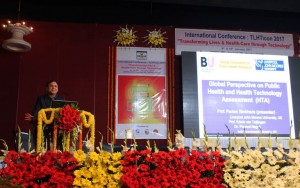
The conference, which attracted more than 180 oral scientific papers and 97 posters, was organized jointly by Datta Meghe Institute of Medical Sciences, DU, Datta Meghe Institute of Engineering, Technology & Research and Yeshwantrao Chavan College of Engineering in association with the Global Consortium for Public Health Research. The Global Consortium for Public Health Research was recently formed [1]. Prof Edwin van Teijlingen, Dr Pramod Regmi, both from HSS, BU are part of it among the 14 academics/researchers from UK, India, Bangladesh, Nepal and few other Low and Middle-Income Countries. Some of them are BU visiting faculty too. Unfortunately, Prof Edwin van Teijlingen could not get a visa in time for India, so he recorded a good-luck message. This pre-recorded message was played to the conference goers.

I found the scientific sessions were a nice blend of scientific talks, plenary sessions, symposia and scientific track sessions. Overall, this conference provided a much-needed platform for academicians, researchers, practitioners and professionals from medical, engineering and industry to disseminate their innovations in interdisciplinary field of health sciences through technology. The conference show-cased innovations in health-care through technology, which shall be useful in transforming lives of people in Low and Middle Income Countries. In these two days; I have been able to all refreshed with thought-provoking & informative talks rendered by experienced researchers around technology in health care.
Dr Pramod Regmi, Post Doc Research Fellow, HSS
Reference:
- Simkhada, P., van Teijlingen, E., Regmi, P.R. et al., 2016. Need and scope of global partnership on public health research. Journal of Datta Meghe Institute of Medical Sciences University, 11 (2), 202-204.
Congratulations to Dr. Sarah Collard on new publication
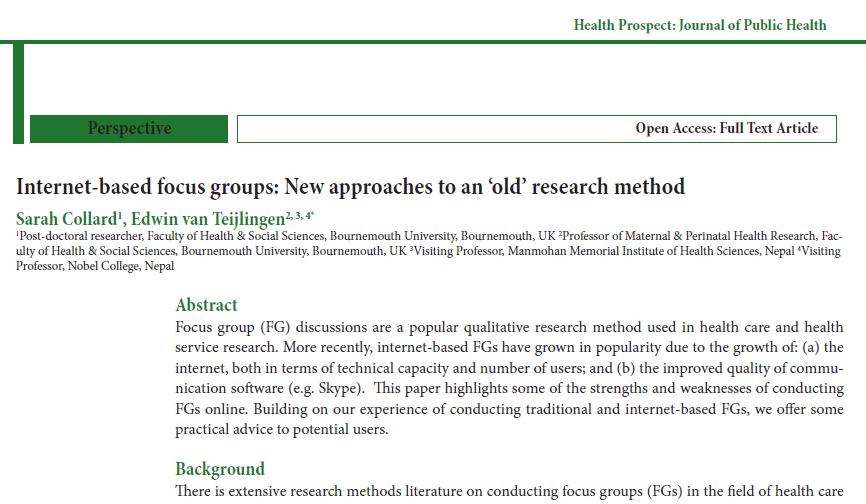 Today saw the publication of a new methods paper by Dr. Sarah Collard, post-doctoral researcher in the Faculty of Health & Social Sciences (FHSS) and Prof. Edwin van Teijlingen in the academic journal Health Prospect. This new paper addressed some of the key methodological issues associated with Internet-based Focus Groups (FGs) or the so-called Online Focus Group Discussions [1]. Traditional face-to-face FG discussions are a popular qualitative research method used a wide-range of areas, such as political sciences, marketing, health service research and sociology to name but a few disciplines. More recently, internet-based FGs have grown in popularity due to the growth of: (a) the internet, both in terms of technical capacity and number of users; and (b) the improved quality of communication software (e.g. Skype). This paper highlights some of the strengths and weaknesses of conducting FGs online. Building on our experience of conducting traditional and internet-based FGs.
Today saw the publication of a new methods paper by Dr. Sarah Collard, post-doctoral researcher in the Faculty of Health & Social Sciences (FHSS) and Prof. Edwin van Teijlingen in the academic journal Health Prospect. This new paper addressed some of the key methodological issues associated with Internet-based Focus Groups (FGs) or the so-called Online Focus Group Discussions [1]. Traditional face-to-face FG discussions are a popular qualitative research method used a wide-range of areas, such as political sciences, marketing, health service research and sociology to name but a few disciplines. More recently, internet-based FGs have grown in popularity due to the growth of: (a) the internet, both in terms of technical capacity and number of users; and (b) the improved quality of communication software (e.g. Skype). This paper highlights some of the strengths and weaknesses of conducting FGs online. Building on our experience of conducting traditional and internet-based FGs.
Dr. Sarah Collard is affiliated with BU’s Centre for Qualitative Research (CQR). Health Prospect is an Open Access journal therefore this article is freely available to any reader across the globe.
Reference:
- Collard, S., van Teijlingen, E. (2016) Online focus group: New approaches to an ‘old’ research method, Health Prospect 15(3):4-7.
Call for Papers for 2017 Nepal Study Days at Bournemouth University
Call for Papers for the 15th Nepal Study Days
12-13 April 2017 hosted by Bournemouth University, UK
The Britain Nepal Academic Council (BNAC) invites scholars and practitioners from all disciplines to participate in the 15th BNAC Nepal Study Days. All presentations should focus on Nepal, its diaspora and/or the Nepali cultural world. We invite presentations that share research findings, preferably of work that has reached an advanced stage or has been completed. The 2017 event will be held in Bournemouth House at Bournemouth University. Details of previous study days can be accessed online here! We also invite proposals for research posters.
If you are interested in participating, please send a 300-word abstract of your proposed presentation to bnacstudyday@gmail.com by 28th February 2017. The Study Days organizing committee will review the proposals received on time and make a selection. Selected abstracts will be circulated to registered participants in advance and posted to the BNAC website.
Members of BNAC may attend the Nepal Study Days for free, though we will ask for a contribution towards the costs of the lunches. For non-members there will be a registration fee of £25, which will include lunch on both days.
We would like to encourage prospective participants to apply for or renew their membership for 2017 in time to be eligible for free registration. To download membership application form and for other details about BNAC membership, please visit www.bnac.ac.uk/membership/.
We hope to be in a position to offer small bursaries towards the travel costs of students from outside Bournemouth whose abstracts are accepted.
Deadline to submit abstracts: 28th February 2016.
Deadline to register for those who are not presenting a paper but who wish to attend: 4th April 2017.
For more information and registration, please contact the Nepal Study Days organizing team (Pramo Regmi, Jib Acharya, Preeti Mahato and Edwin van Teijlingen) at bnacstudyday@gmail.com.
The application form can be found here!
We suggest you book your accommodation in Bournemouth well in advance. To download the list of hotels close to the programme venue, click here.
For details about new membership application (and to download forms) or renewal, click here
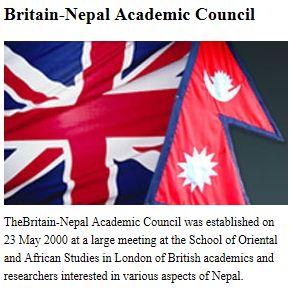
Prof. Edwin van Teijlingen
Dr. Pramod Regmi
Mr. Jib Acharya
Mrs. Preeti Mahato
Faculty of Management academics are keynote speakers at MEAconf
Two Faculty of Management academics, Dr Mohamed Haffar and Dr Elvira Bolat, are selected as keynote speakers for the 6th International Conference on Modern Research in Management, Economics and Accounting, which is held on 15th November at London South Bank University.
Dr Haffar from the Department of Leadership, Strategy and Organisational Behaviour is presenting on the following topic, ‘Guidelines for organisational sustainability in an era of radical change: The vital role of employees readiness and commitment to change’. Dr Bolat from the Department of Marketing is talking about ‘Digital transformation and its implications for academia and practice’.

The MEAConference aims to pave an international way for leading academics, active researchers, experts, industry leaders and interested scholars to communicate and exchange their viewpoints on latest scientific findings and practical experiences in the fields of Management, Economics and Accounting. Besides, the Conference attempts to examine the scientific and practical challenges in their application process across all geographical regions as well as at diverse local, national, regional and international levels.
Inaugural lecture: how supermarket scanner data reveals the secrets of the checkout

Most of us shop for food in supermarkets on a regular basis, but do we give enough thought to the data gathered about our shopping habits? Barcode scanners can provide supermarkets with a wealth of information about consumer behaviour and food pricing.
Professor Tim Lloyd joined Bournemouth University in 2015 and is an expert in agriculture and food pricing. His current research includes looking at the use of supermarket scanner data and the factors that lead to food price inflation within Europe. His interest in food economics stemmed from his undergraduate studies when the focus was on food mountains deriving from European subsidies, offset by starvation in Africa as highlighted by Band Aid.
Fast forward to the present day, and the issues facing us now are quite different. The prevalence of fast food and processed foods mean that people are at risk of both over-nutrition and malnutrition, while our high streets are dominated by multinationals with a keen interest in data about their consumers.
Professor Lloyd’s lecture will share insights from his research into supermarket pricing, focusing on the widespread use of price promotions in modern food retailing. It may just change how you shop.
Bournemouth University’s inaugural lecture series aims to celebrate new professorial appointments and the depth and breadth of research produced by the university. For further information on the inaugural lecture series, please visit www.bournemouth.ac.uk/public-lecture-series
About the event
To book your free ticket, click here.
Venue: Executive Business Centre, Holdenhurst Road.
Date: Monday 5 December.
Time: 6:30pm for a 7pm lecture start.
Refreshments will be provided at the event.
For more information about the event, please contact Rachel Bowen at rbowen@bournemouth.ac.uk.
New Publication: Businesses and mobile social media capability
Bournemouth University’s, Dr Elvira Bolat and Dr Kaouther Kooli, and Professor Len Tiu Wright from University of Huddersfield have published new article in Journal of Business and Industrial Marketing.
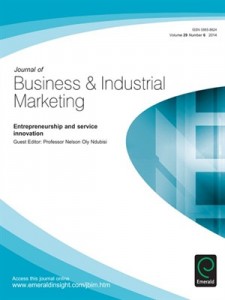
“The study is amongst the first to provide insights into B2B firms’ practices of using mobile social media. This paper found that marketing and advertising firms use mobile social media for branding, sensing market, managing relationships and developing content. Mobile social media is treated by businesses as a strategic firm-specific capability that drives firms’ competitiveness, where imitation of such capability by competitors is limited because mobile social media skills are specific to individuals within organisations and mobile social media routines are manifested as a result of firm-specific mobile social media skills’ interactions.”
Access full article by clicking on the image below.
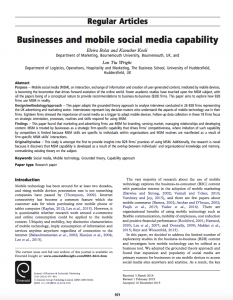











 REF Code of Practice consultation is open!
REF Code of Practice consultation is open! BU Leads AI-Driven Work Package in EU Horizon SUSHEAS Project
BU Leads AI-Driven Work Package in EU Horizon SUSHEAS Project Evidence Synthesis Centre open at Kathmandu University
Evidence Synthesis Centre open at Kathmandu University Expand Your Impact: Collaboration and Networking Workshops for Researchers
Expand Your Impact: Collaboration and Networking Workshops for Researchers ECR Funding Open Call: Research Culture & Community Grant – Apply now
ECR Funding Open Call: Research Culture & Community Grant – Apply now ECR Funding Open Call: Research Culture & Community Grant – Application Deadline Friday 12 December
ECR Funding Open Call: Research Culture & Community Grant – Application Deadline Friday 12 December MSCA Postdoctoral Fellowships 2025 Call
MSCA Postdoctoral Fellowships 2025 Call ERC Advanced Grant 2025 Webinar
ERC Advanced Grant 2025 Webinar Update on UKRO services
Update on UKRO services European research project exploring use of ‘virtual twins’ to better manage metabolic associated fatty liver disease
European research project exploring use of ‘virtual twins’ to better manage metabolic associated fatty liver disease